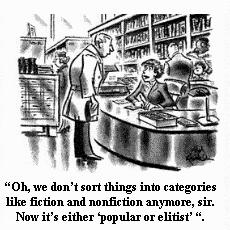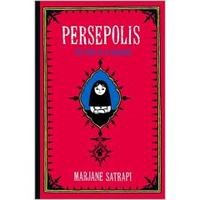
When one reads non-mainstream non-bestselling book for fun, does it make him or her an elitist? Well, that is so far from the truth mainly because there is no fine line between popular fiction and literature.
What may be popular fiction now can become high literature in the distant future. So, I don't think it's logical for critics to be dishing out "elitist" comments just because their cerebral hemispheres can only accommodate works by Mitch Albom, for what they're reading can become tomorrow's Steinbeck and Faulkner. This shows that there is no point really in comparing today's bestsellers in favor of ancient tomes or non-mainstream books, because both of them are literature in their own right. Both of them should be read without prejudice against the other.
Although Da Vinci Code, Lemony Sicket's, Sandman series (Hugo Prize winner) and Harry Potter have yet to win any major book award, suffice to say that they don't need awards to prove that they are great pieces of literature. Public acclaim and glowing reviews say it all. On the other hand, it doesn't mean that award-winning works are dust-covered has-beens that no one ever cared to open and that only stuffy bespectacled professors enjoyed reading. Even if some of them are way too cerebral for my taste, most are really good reads with rich complicated plots. A few of them are: Groyon's "Sky over Dimas" (2003? Palanca Prize Winner), Martel's "Life of Pi" (Booker Prize Winner), and Steinbeck's "Grapes of Wrath" (Pulitzer Prize Winner.) And yes, their equally-glowing reviews are as extensive as that of Harry Potter's. If only we give them a chance, then perhaps they will become bestsellers soon. Oprah did her share by choosing the "Grapes of Wrath" for her Book Club hence, resurrecting an old classic to the light.
Besides that point, just because one enjoys reading popular fiction (Dan Brown, Danielle Steele) does not mean he or she is incapable of enjoying literature by Victor Hugo or Alexander Dumas. While it is God-given freedom in choosing to remain stagnant in the popular fiction section, there is joy to discover the non-popular works of the classical authors (Boccaccio to Hemingway) and critically-acclaimed writers (Coatzee to Ishiguro.) And one is never handicapped to savor the richness of the classics. If one does enjoy reading the classics which only a few cared to take a second look, does it make you an elitist? A non-conformist maybe, but an elitist? Never. Expanding one's horizon is never an elitist pastime, while the reverse may be true. By choosing to have a narrow shelf of reading material, one closes out on other genres of literature, thereby becoming a snob of popular fiction.
For those snobbish commentators who prefer to wallow in their Chickensoup world, I'd like to ask how many books (or genres) can one read so as not be labeled "elitist?" Probably in their case, just one. And the Bible doesn't count. It does not make anyone stupid by reading a single book all his life, but it certainly does not make that person smarter either. Reading is a matter of addition, of enriching one's brain, but never subtraction. Reading is a matter or repetition, tome after tome, and the more you read, the more is one's understanding of the world at large and of the human psyche. Conversely, by not choosing to read other works, stereotypes, biases and prejudices are formed and from ignorance, fear is born.
 Last Sunday, I met a couple of high school friends for another of those "weekend" get togethers. As usual, Powerbooks in Greenbelt was the obvious choice- mainly because of the cool airconditioning and partially because one can spend the entire time reading their books. While browsing through their shelves, I spotted a curious volume. Marjane Satrapi's "Persepolis"** is a totally cool autobiographical graphic novel about the evolution of Iran's Islamic revolution and life under Ayatollah Khomeini. I was enthralled by the honesty of her work showing that not everyone in Iran supports the regime and that the revolution was well deserved. The point is, I wasn't aware that the ordinary Iranians hated the regime had it not for Persepolis. I thought that the shah was good and the Islamists bad (as what Clavell's "Whirlwind" and Western media like CNN wants us to believe.) I didn't buy the book but finished it in the cool confines of PowerBooks.
Last Sunday, I met a couple of high school friends for another of those "weekend" get togethers. As usual, Powerbooks in Greenbelt was the obvious choice- mainly because of the cool airconditioning and partially because one can spend the entire time reading their books. While browsing through their shelves, I spotted a curious volume. Marjane Satrapi's "Persepolis"** is a totally cool autobiographical graphic novel about the evolution of Iran's Islamic revolution and life under Ayatollah Khomeini. I was enthralled by the honesty of her work showing that not everyone in Iran supports the regime and that the revolution was well deserved. The point is, I wasn't aware that the ordinary Iranians hated the regime had it not for Persepolis. I thought that the shah was good and the Islamists bad (as what Clavell's "Whirlwind" and Western media like CNN wants us to believe.) I didn't buy the book but finished it in the cool confines of PowerBooks.Check out Craig T. Fehrman's article, "Comfortable Books and Creative Reading". It explores the war between popular fiction and creative literature in America. And it talks about on how the Internet is affecting it all. A good article. Less inflammatory. Cheers!
**click on Persepolis link for an excerpt from the graphic novel.
No comments:
Post a Comment